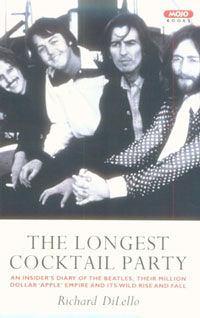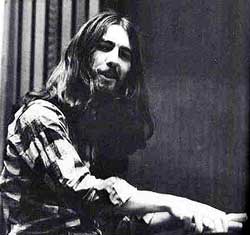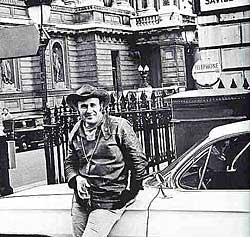Although we knew George had been sick for awhile, his death when it came was shocking and sudden. It wasn't all that unexpected, actually, he'd been sick for years. But since the attack by a crazed fan two years ago, George had become almost pathological in protecting his private life. What little information got through about his condition was unfailingly positive.
In the last few days, there have been many, many Georgian panegyrics and evaluations of his influence—and there will be more to come—so I thought I’d just tell a few stories about my walk-on in the Life of George.
In the late sixties I shared a house with Stanley Mouse and Richard Dilello in Ladbroke Grove in London. Richard worked at Apple, and somehow I ended up writing a book for the Beatles with Jonathan Cott. It was called Get Back, and was included in the Beatles last (UK) album, Let It Be. (My friend Richard eventually wrote the best book you’ll ever read about Apple and the Beatles: The Longest Cocktail Party. Recently reprinted.)
 |
| Click on the cover to buy it at Amazon. |
|
In those days, George spent quite a bit of time at Apple. He was producing albums (one by his old Liverpuddlian mate, Jackie Lomax), and could often be found talking to the cosmic and roguish Beatles press agent, Derek Taylor. Of all the Beatles, George was the most accessible—but this wasn't always such a good thing. Gods pretending to be human beings is one thing. Gods descending to your level—well let’s just say it’s a bit scary. John and Paul were already world-class actors and very grand in their own very different ways. Ringo was impenetrable; he was a nice friendly bloke, but you were never going to find out who he really was. George was more like one of us.
He wasn’t always St. George, however—especially to people he didn’t know, people who worked for him, people who wanted things from him. This is all pretty normal behavior for a rock god—but he had his own demons and, like Ringo, felt that some gods were more equal than others. The first time I met him, he attacked me. He took one look at me and pounced. "Wot the fook we ’ave ’ere, then?" he said. "Hair down to your arse, beads and bracelets? Oh, you think you're so bloody hip don't you, you guys from the great Haight-Ashbury!"
I was stunned. George was my hero. I didn't have time to kneel and say I'm not worthy (or that I wasn't from San Francisco). George turned on his Spanish heel and was gone. What had I done? I was wearing pretty standard hippiewear—some of the clothes were actually from the Apple boutique (and believe me, that wasn't where hip people shopped).
He could just as easily be arrogant in the grand Persian manner. One night George and Billy Preston were watching a TV show up at Apple. Billy was performing that night on a variety show called Talk of the Town. I was sitting on the floor blissfully happy to be among the gods and felt especially favored when George asked me to turn the sound up. After several more requests to "turn the fookin’ thing up," I told him that that was as loud as it went. George looked at me ferociously and in high imperial mode demanded that I turn the bloody volume up. Yeah yeah, I know, just a regular bloke who happened to be a god, and was used to getting the impossible done for him. I imagined more diligent gofers than me heading out in the middle of the night in search of Phillips’ head screw drivers, orthicon tubes, mini pre-amps or some crazier item still, ready to take the entire TV set apart piece by piece and not stop until the music was louder. Billy chilled us all out by saying, "David, he just messin’ witcha, man. It’s a piece of shit, anyway. Let’s go out and get something to eat." So we went to an Indian restaurant—where else?—and George told stories about Ravi Shankar in a Peter Sellers Indian accent. "My goodness, what is this sort of thing you are playing there, George?" Shankar asked him about his sitar playing on "Norwegian Wood." "If you don’t mind me saying so, it’s the sort of frightful, twangy thing you hear on Radio Bombay advertising soap powders."
 |
During the Let It Be sessions there was a tense moment. George was wailing on his Gretsch, happy as a clam, when Yoko suddenly began wailing along with him. For a while George just looked non-plussed. The madwoman of Tokyo screamed louder and louder, and George’s head started to lower—ominously. He raised up his guitar like a sacrificial victim and hurled it to the ground. Did I mention that George loved Gertsches? He played them in honor of his idol, Chet Atkins. George loved country music; Carl Perkins was his favorite. His songs always had a country lilt to them. Anyway, there’s the Gretsch, writhing and seething on the ground like a thing alive, and there’s George walking out the door. After he’s gone, there’s a pretty cold conversation between John and Paul about what to do if he doesn’t come back. "I hear Eric isn’t doing too much these days," says Lennon with chilling matter-of-factness.
Richard saw a lot more of George than I, so I asked him the other day, "George was basically a nice guy, right? I mean, everybody on the news says he had a dark side, but nobody talks about what it was, exactly."
"He was half and half. He could be very difficult and unpleasant and prickly, even at times a bastard. But then there was the other side to him, generous and, uh, kind…." Richard replies, choosing his words carefully.
"Didn't you stay at George's house for a while?" I ask.
"A month. I went down the first week George bought Friar's Point, his gothic mansion near Henley. He asked me to come over and take some photographs of the place. I spent a week methodically taking pictures of everything. 40 acres, 40 rooms. The day after I'd shot my last roll, Eric Clapton showed up with one of those monkey bikes—tiny motor scooters—and we were having a race around the grounds on them. I hit a low garden wall and got thrown over the handle bars. The moment I landed on my chest it really hurt, and I knew something was wrong. The pain got worse and worse, and finally I said to George, 'I'm a bit embarrassed to tell you this but I think I broke something.' He put me in the Ferrari and drove me to the local hospital at Henley-on-Thames. He waited while they x-rayed me and bandaged me up—they couldn't locate the bandages so they used tea towels.
"‘I seem to have broken my collar bone,’ I told George apologetically back in the waiting room."
"‘I think you'd better stay with us then,’ he said."
"What was it like at George’s gothic pile?"
"Well, he was pretty grouchy most the time. An unhappy guy. Maybe he'd always been that way, misanthropic and bitter, but fame certainly didn't help. George always regarded fame as a total curse."
Reminiscing with Richard I remembered a couple of Harristories typical of the misunderstandings that arose from the mingling of gods, angels, and mortals.
One day Richard called me from Apple and said, "How’d you like to have a Hell’s Angel, his Mama and his hog stay with us a few days?" Well, sure! It’d be an honor. And just how had this come about? Well, the previous summer George had gone to visit Haight-Ashbury (ah, maybe that’s where his animus against H-A hippies came from). He was curious, George. He was the first Beatle to come to America (pre-Beatlemania), the first to get into Eastern religion (is this a good thing?), the first rock star to raise money for charity (the Concert for Bangladesh) and the first and only Beatle to go and check out the Haightgeist.
Ken Kesey
 |
As he was sauntering down Haight Street he’d casually invited a couple of Hell’s Angels—in a very Brit sort of way—to come and stay with him if they ever came to London, never thinking they’d take him up on it. But, George, you don’t know those California boys. "Man, Christmas with the Beatles!" they said to themselves, taking George at his word. Crazy Pete and Tumbleweed Bill and Ken Kesey and a bunch of other California crazies—egad! Barbarians at the gates! When the Angels actually did show up at Apple… George hid. No room in the 40-room mansion, apparently. And that’s how we happened to end up with two Hell’s Angels sleeping on our bedroom floor. Thanks, George, you don’t know what you missed, man.
A few days later George had another little job for us. He wanted us to get him a pound of hash for his Yule celebrations. A pound of hash! Nobody outside of yer actual criminal element had ever seen such a thing. Nevertheless, in the way you talked to royalty, we assured him it was no problem. Easy as pie! We’ll be back tomorrow morning with your hash, man.
Now, what were we going to do? The only people we knew who had that kind of quantity were some truly scary Jamaicans down the Portobello Road. We entered this den of thieves and cut throats, ganja smoke so thick you could hardly see across the room. "Show us the money, mon, and we talk." We pulled out the big fat five-pound notes. "Er, man, can we see the hash?" we asked hesitantly. "There ya go, mon," said he, and handed us a long piece of hash wrapped in linen. But was it a pound? Richard and I looked at each other. We were dubious. "Is there a problem with it, mon?" They laughed darkly. We slid out of the room. Back at the house we weighed it. Omigod, it was barely 13 ounces. Yikes! Now what were we gonna do? Oh well, at least rock stars don’t actually kill you when you fuck up—they probably just make you leave (a fate far worse than death). We’d never be made men now.
Next morning up at Apple, George ushers us into a side room. We nervously unwrap the slab of hash. Tense moments tick by—we’re about to trot out our lame excuses when George beams. He’s ecstatic. He’s like a child on Christmas morning. He calls in Derek and Ringo. "Come in here, you gotta see this, man!" Everyone is duly impressed. George goes into the kitchen, gets a carving knife, cuts off a huge chunk and hands it to us. "Merry Christmas, guys!"